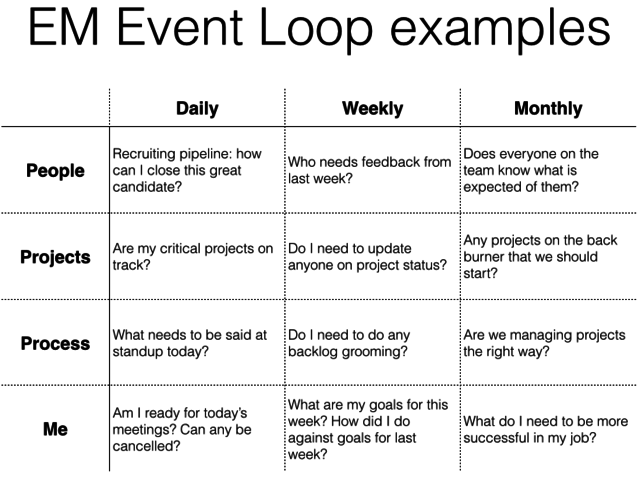
A 90-Day Plan for New Engineer Managers
“When I first became a manager, I spent at least six months just faking it. I built out our scheduling and thought, ‘I guess we need to have meetings…’ so we created meetings. Basically I just replicated what I saw around me.” That’s how Twitter’s former Director of Engineering, David Loftesness, described his first few rounds in management positions.
You’ve seen it and lived it. A manager leaves for another position mid-project. The engineer with the most knowledge of the project takes over as team and project leader. Everyone is so busy keeping the project on track, managing the day-to-day, and putting out fires, that there is no time for management training.
After 20 years and six tech companies, Loftesness designed a 90-day plan to grow engineers into managers.
(Day 0) Accept a new reality.
It can be a challenging transition to go from individual contributor to manager. Will you still enjoy your job if you are no longer coding? Lofteness encourages potential managers to look at three types of relationships: Your team, your peers, and your manager.
Are you ready to manage former peers and take responsibility? Can you communicate effectively with your new peers—other managers? How will you communicate and work with your new manager?
(Days 1-30) Level-up on skills.
Great engineers don’t develop overnight – neither do great engineering managers. Loftesness advises engineers level-up on their management skills by blocking time on their calendars to read management books, take online courses and meet with management mentors.
(Days 31-60) Find a rhythm.
Take a hard look at how you spend your time in the second month. What tasks can be delegated? Are you holding onto tasks from your former position? How do you schedule time when engineers need to meet one-on-one? Do you need to attend every meeting?
“I think being judicious — even vicious — about canceling meetings is a key habit to start early,” says Loftesness. “Of course, be respectful if you decline, but always protect your time. People will invite you to meetings because other managers are attending or they’ve just cast a wide net. It’s easy to feel obligated. I encourage my managers to ask themselves, ‘Is this meeting important to getting your job done?’”
Loftesness advises new managers create an “event loop” or management checklist. This checklist ensures new managers make time for important tasks.

Image by David Loftesness via First Round Review
(Days 61-90) Reflect and self-assess.
Take 30 days to assess if you want to keep the management position and if it is truly a good fit for your skills. If you do, continue to develop your leadership skills. If not, talk to your manager about other ways you and your skills can best contribute to the team.
“Don’t think of it as stepping down, but rather focusing on your strengths and what motivates you,” says Loftesness. “You shouldn't take an ego-beating if you step down from the role. It’s really important to recognize that something isn't working for you and to be able to step back to, hopefully, the thing that you love.”
Kettering Online's Innovative Master's Degree in Engineering Management
Getting your engineering management degree online at Kettering University distinguishes you from others in myriad ways. The Engineering Management master’s degree provides the theory and application of technical skills as well as delivers the holistic leadership, communication and soft skills necessary to manage a high-technology, cross-disciplinary team. Better yet, it provides an opportunity to become a better you!

